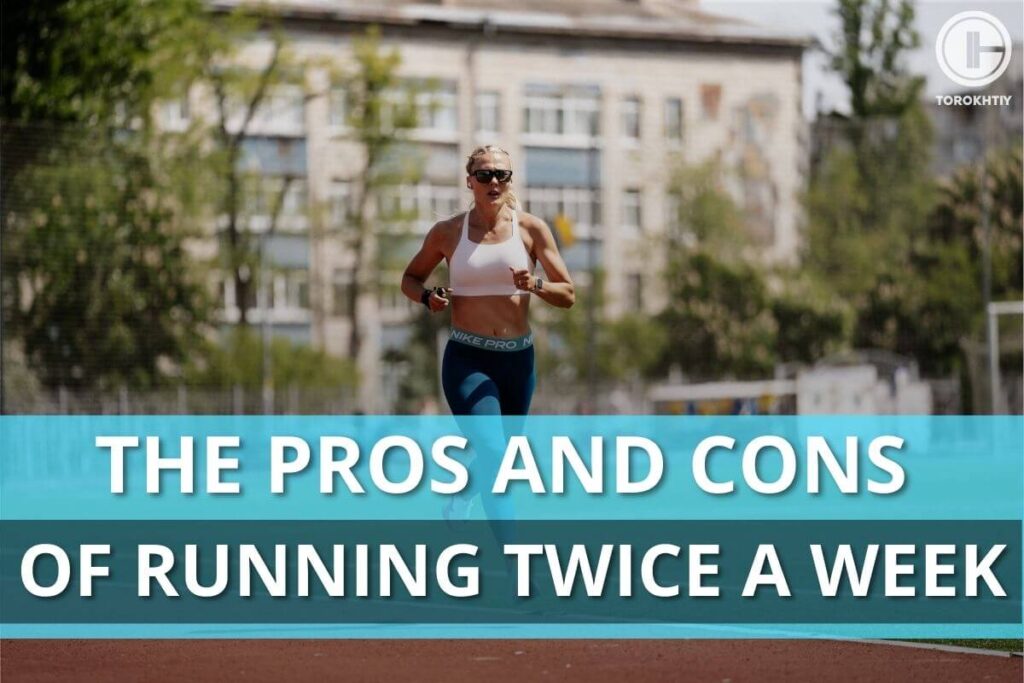The Pros And Cons Of Running Twice A Week
Author:
Unlock your full potential by engaging with our experts and community! Have questions about your fitness journey or looking for expert advice on weightlifting techniques? Don’t hesitate — leave a comment below and Viktoriya Tkachuk will provide a personalized answer and insights to help you reach your goals.
Torokhtiy is reader-supported. Some links are affiliate links, and we may earn a commission at no extra cost to you. See our disclosure page for details.
Are you looking for ways to improve your health and fitness? Running twice a week can help keep the body in great shape. In this blog, we will discuss how running just two days a week can have enormous benefits that reach far beyond your physical appearance.
We’ll also provide helpful advice, such as how long runs should last when running twice a week to meet your goals. Let’s take a look at the many benefits runners receive from going for a run twice a week!
Is Running Twice A Week Enough For Good Health? — It can help improve overall health and fitness, including weight loss, cardiovascular health, and improved mood. It is important to adjust your workout program according to your needs and goals and add strength training or other forms of exercise.

Running Twice A Week
Two runs a week can be an effective and suitable training routine for people looking to improve their health and fitness. Factors such as fitness level, goals, and time availability may play a role in deciding how often you should go for a run.
Is Running 2 Times A Week Enough?
Have you wondered how many times to run a week? Running 2 times a week can be enough to see improvements in health and fitness. While running every day may offer more benefits, 2 times per week still plays an important role in overall well-being.
Novice runners may find that 2 days per week is enough to maintain overall good health and achieve aerobic gains. People starting with slow endurance distances of 5-10k can benefit from this frequency during initial training, before gradually increasing mileage.

3 Benefits Of Running Twice A Week
Here are the 3 main benefits that you can get by running two times a week:
✅ Weight Loss
Running twice a week to lose weight is an excellent way to help burn body fat. Shorter, higher-intensity runs will increase calorie burn, while longer, lower-intensity runs encourage the body to use stored fat for fuel.
Incorporating both types of running into a program can be beneficial for managing your weight in the long term. So whether you’re trying to shed some extra pounds or just want better control over your current weight, consider committing yourself to running at least twice per week.
✅ Prevents Bone And Cardiac Issues
Research has shown that regular running can strengthen your heart and lungs, reduce risk factors for developing cardiac issues, and lower the risk of death from cardiovascular disease. Moreover, this type of exercise is weight-bearing, which helps to build strong bones and makes them less susceptible to injuries and osteoporosis.
✅ Boosts Mood And Reduces Stress
Regular running at a moderate intensity can have many psychological benefits. Running releases endorphins and serotonin—chemicals that help create feelings of well-being—giving you an immediate sense of satisfaction after completing the exercise. Studies have also linked regular running to improved efficacy in tackling symptoms related to depression and anxiety.
2 Disadvantages Of Running Twice A Week
Running twice a week can also have some disadvantages.
❌ Less Endurance Benefits
Those who only do two easy runs a week may experience diminished speed, decreased aerobic capacity, and reduced physical performance compared to people who run 3-4 times a week. This is based on fewer opportunities for training variation and skill development as runners are limited in both frequency and volume when they only train twice a week.
❌ Slower Progress And Limited Skill Development
Running just two times a week can have detrimental effects on your rate of progress, compared to running more often. This is especially true for athletes trying to push their times over longer distances that require intense training. They likely won’t get enough conditioning within only 2 runs per week.
The biggest challenge that many runners face when they do only two days of exercise per week is integrating enough variety into their workouts. Too often, runners end up doing the same run or type of session repeatedly, which means they don’t enjoy the benefits of mixing up their routine.
Twice A Week Running Program: How To Start Running?
A beginner starting to run for the first time should set short-term goals and start with regular walks of varied distances to increase their endurance. Gradually increase duration and intensity at a comfortable pace that is manageable and in line with your fitness level.
Tips From the Champ
To realize the full benefits of running twice a week, map out your route ahead of time so you can accurately assess your progress over time.
Ukrainian Professional Athlete
Generally, beginner runners may find 1k and 2k runs suitable for maintaining an aerobic base, while more experienced runners can push themselves further with longer distances and higher intensity workouts.
When planning out your twice-a-week running program, consider incorporating runs of 1k, 2k, 5k, and 10k.

4-Week Twice-A-Week Running Program
Running twice a week provides enough rest for muscles to recover and helps prevent injuries. This type of program allows more time for cross-training and strength training, which increases overall fitness.
| Week | Monday | Tuesday | Wednesday | Thursday | Friday | Saturday | Sunday |
|---|---|---|---|---|---|---|---|
| Week 1 | Rest day | 2-mile jog | Rest day | Cross-training | 600m run/400m jog x2 | Rest day | Strength training |
| Week 2 | Rest day | 2-mile easy run | Rest day | Cross-training | 800m run/200m jog x2 | Rest day | Strength training |
| Week 3 | Rest day | 3-mile easy run | Rest day | Cross-training | 800m run/200m jog x3 | Rest day | Strength training |
| Week 4 | Rest day | 3-mile run | Rest day | Cross-training | 1000m run/200m jog x3 | Rest day | Strength training |
As runners become more trained and experienced, they can consider adding longer distances of anywhere between 5k to 10k per session. You may also include intervals and longer runs if you are trying to build up stamina levels even further.
Calculator Of Running Time
This running time calculator employs a formula that takes into account the distance, gender, level of training, and age of the runner. Anyone can check the approximate time to cover their desired distance.
Running Time Calculator
Result:
How Long Should Runs Last When Running Twice A Week?
The length of each run will depend on your individual fitness level and goals. If you’re an experienced runner, you may choose to complete longer-distance runs, such as 10k or more per session.
With beginners, however, it is often recommended to start with shorter-distance runs, such as 3-5k per session.
Hoka Bondi 8
- Material: Breathable and supportive mesh upper
- Sole Material: Full-length EVA midsole for maximum cushioning
- Outsole (tread feature): Durable rubber outsole with a unique lug pattern
- Drop: 4mm
- Season: Suitable for all seasons
- Special Features: Exceptional cushioning and comfort
- Size: Available in various sizes
- Type: Maximum cushioning running shoe
If you want excellent running or walking shoes or just footwear you’ll be comfortable in, you can’t go wrong with the Hoka Bondi 8.
It’s been upgraded and now they have lighter, softer materials and a new extended heel design. The heel design gives a super soft, balanced feeling from th emoment your heel hits the ground to when you push off with your toes.
As far as the weight goes, it’s around 10.80 ounces, and the heel drop is 4 mm. They’re not too heavy and the lower drop is a good balance between cushioning and feeling connected to the ground.

The Bondi 8 is focused on cushioning and keeps things simple. There’s a good amount of support without any extra stuff that you don’t really need and that would only jack up the price. Take the rear crash pad, for example – it makes for a soft, smooth ride, which is perfect if you like to run outdoors.
The upper part is made of engineered mesh, which is breathable and keeps your feet cool and dry. The tongue and collar have memory foam and mold to your foot shape. All of these features make the fit snug but flexible, which is exactly what you would want.
The Bondi 8 is eco-friendly because it uses recyclable materials in parts like the mesh and the sockliner. Plus, the shoes are completely vegan, which (if that’s important to you) is nice!
Do Runners Who Run Twice A Week Need To Add Training To Improve Endurance?
Running twice per week provides cardiovascular benefits and helps maintain ideal weight, but adding other exercises may be necessary to improve overall fitness and prevent injury.
Tips From the Champ
Adding extra exercises, such as cross-training or weight lifting, will increase strength and muscular endurance while also reducing the risk of burnout from repetitive movement patterns.
Ukrainian Professional Athlete
Additionally, consider including activities like yoga to help stretch the muscles used in running and reduce soreness after a run.

FAQ
Can You Train For A Marathon On Two Runs A Week?
Depending on the runner’s goals and fitness level, running twice a week can be a way to prepare for a marathon. You have to carefully plan your training to build endurance and speed, while increasing the overall weekly distance. Add 2-3 strength training and cross-training like cycling to build muscle mass and increase stamina.
How Many Days A Week Should I Run?
For beginners or recreational runners, 1-2 runs per week is generally enough to stay healthy and in shape. But if you are aiming for faster times or longer distances, then additional runs may be necessary to improve your performance.
Can I Lose Weight By Running 2 Times A Week?
Running twice a week can definitely contribute to weight loss by burning excess calories and increasing your resting metabolic rate.
Conclusion
Running twice a week is an effective way to improve overall health and fitness. It has been proven to provide a range of benefits, such as weight loss, improved cardiovascular health, strengthened bones, and reduced risk of various medical conditions.
Runners who choose to run only two times per week can supplement their program with other forms of physical activity, like strength training or other aerobic exercises, for best results.
How many times a week do you run? Please share your experience in the comments below.
Also read:
References:
- Better Health. Running and Jogging – Health Benefits. https://www.betterhealth.vic.gov.au/health/healthyliving/running-and-jogging-health-benefits
- Lee, Duck-Chul et al. “Leisure-time running reduces all-cause and cardiovascular mortality risk.” Journal of the American College of Cardiology vol. 64,5 (2014) https://linkinghub.elsevier.com/retrieve/pii/S0735109714027466
- Craft, Lynette L., et al. “The Benefits of Exercise for the Clinically Depressed.” Primary care companion to the Journal of clinical psychiatry vol. 6,3 (2004): 104-111. https://www.ncbi.nlm.nih.gov/pmc/articles/PMC474733/
- Williams, Paul T. “Greater weight loss from running than walking during a 6.2-yr prospective follow-up.” Medicine and science in sports and exercise vol. 45,4 (2013): 706-13 https://journals.lww.com/acsm-msse/fulltext/2013/04000/greater_weight_loss_from_running_than_walking.13.aspx
- Atakan, Muhammed Mustafa et al. “Evidence-Based Effects of High-Intensity Interval Training on Exercise Capacity and Health: A Review with Historical Perspective.” International journal of environmental research and public health vol. 18,13 7201. 5 Jul. 2021 https://www.mdpi.com/1660-4601/18/13/7201
- Photos made by Torolhtiy Media Team.
Why Trust Us?
With over 20 years in Olympic weightlifting, strength training, nutrition coaching, and general fitness our team does its best to provide the audience with ultimate support and meet the needs and requirements of advanced athletes and professional lifters, as well as people who strive to open new opportunities and develop their physical capabilities with us.
By trusting the recommendations of our certified experts in coaching, nutrition, and sports training programming, as well as scientific consultants, and physiotherapists, we provide you with thorough, well-considered, and scientifically proven content. All the information given in the articles concerning workout programming, separate exercises, and athletic performance, in general, is based on verified data.
The product testing process is described in more detail here.
Author: Viktoriya Tkachuk
Ukrainian Professional Athlete
Best Results:
400 metres hurdles is 53.76 seconds
2nd place in European Championships in 2022
Ukrainian athlete specialising in the 400 metres hurdles. She won the silver medal in the event at the 2022 European Athletics Championships.
Tkachuk represented Ukraine at the 2016 Rio Olympics without advancing from the semi-finals, and at the 2020 Tokyo Olympics, where she placed sixth in the final.







Still have questions after reading our article? Unlock your full potential by engaging with our experts and community! Don’t hesitate — leave a comment below and Viktoriya Tkachuk will provide a personalized answer and insights to help you reach your goals.